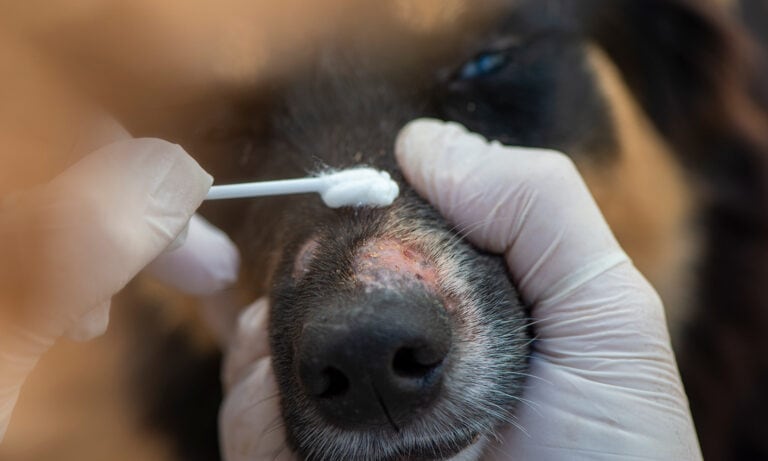Pancreatitis in dogs is relatively common, since some of their favorite human foods, like cheese, can contribute. But the clinical signs can be non-specific, which often makes it difficult to recognize. Plus, all cases of pancreatitis aren’t the same, so your dog may react differently than another pup.
Because of this, it’s important to stay informed so you know exactly what symptoms to look for and when to call your vet. (Spoiler alert: If you suspect pancreatitis, contact your vet right away.) Severe pancreatitis can quickly become a medical emergency, so getting the right care as soon as possible is vital.
In This Guide:
What Is Dog Pancreatitis?
Simply put, dog pancreatitis is inflammation of the pancreas, the organ that’s responsible for producing insulin and helping regulate blood sugar.
According to Dr. Sara Ochoa, DVM, a veterinarian at Animal Hospital of West Monroe in West Monroe, Louisiana, and the co-founder of How To Pets, pancreatitis typically develops when a canine’s pancreatic enzymes have gone haywire and start attacking the pancreatic tissue itself.
Acute vs. Chronic Pancreatitis
There are two categories of pancreatitis: acute and chronic.
- Acute pancreatitis comes on suddenly and severely, but usually only lasts a few days with proper treatment.
- Chronic pancreatitis causes milder but recurrent signs over time that can lead to permanent damage.
Dr. Ochoa says to think of it as the difference between a one-time stomach bug versus chronic indigestion.
What Are the Symptoms of Dog Pancreatitis?
Both types of pancreatitis present the same way, but acute pancreatitis may cause more severe symptoms.
The most common clinical signs of pancreatitis in dogs are:
- Nausea
- Vomiting
- Lethargy
- Fever
- Abdominal pain
- Diarrhea and gastrointestinal upset
- Loss of appetite
- Dehydration
- General malaise
As a pet parent, you may notice your dog moping around, acting like they don’t feel well. Your dog may also take up a praying position, with their head lowered to the ground and back-end up in the air. If you see this, it’s important to contact your veterinarian right away, as it can be a sign of severe pancreatitis, especially if it’s coupled with pain and/or vomiting.
In severe cases, pancreatitis can be life-threatening. Shock and severe depression are signs of worsening pancreatitis in dogs, and can lead to organ failure and even death. If you suspect pancreatitis, contact your vet right away.
What Causes Pancreatitis in a Dog?
The exact cause of pancreatitis in dogs is not always known, but there are several risk factors and medical conditions that can contribute to its development, according to Dr. Bethany Hsia, DVM, mobile veterinarian and co-founder of CodaPet in Clovis, California.
The most common causes of pancreatitis in dogs are:
- Obesity
- High-fat diets
- Abdominal trauma
- Infections
- Diabetes mellitus
- Hypothyroidism
Acute pancreatitis can also be triggered by a dog eating something that’s not part of their regular diet, such as table scraps or garbage.
How Do Vets Diagnose Pancreatitis in Dogs?
If your vet suspects pancreatitis, they’ll diagnose (or rule it out) through a comprehensive visit that combines a physical examination, gathering medical history and diagnostic tests. The exact diagnostic tests depend on what your vet suspects may be going on, but generally include some combination of the following:
- Blood tests to measure the levels of pancreatic enzymes (specifically lipase and amylase) in the blood
- Imaging tests such as X-rays, radiographs or abdominal ultrasounds to visualize the pancreas
- CT scans or MRIs, if specialized tests are required
Dr. Andrea Johnston, a board-certified small animal veterinary internist and medical board member at The Vets, says a definitive diagnosis of pancreatitis may sometimes require a biopsy.
How Do Vets Treat Pancreatitis in Dogs?
Once pancreatitis is diagnosed, treatment is usually a multilayered approach focused on making your dog more comfortable, while also addressing underlying contributing factors. Addressing the root cause(s) is vital to reducing the risk of recurrence.
Treatment for pancreatitis in dogs typically involves:
- Supportive care, such as IV fluid therapy to correct dehydration and maintain electrolyte balance
- Pain medications and management
- Nutritional support
In severe cases, vets may also administer medications to control vomiting and diarrhea, or provide oxygen therapy to help the dog breathe more easily, according to Dr. Hsia.
If the underlying cause of the pancreatitis is known, vets will also recommend specific treatments to address that issue. For example, if hypothyroidism is the underlying cause, part of the treatment plan will involve balancing the thyroid and your dog’s hormones.
Regardless of the underlying cause, Dr. Ochoa says diet changes are also fundamental for treating and preventing pancreatitis in dogs.
Diet for Dogs with Pancreatitis
The right diet for a dog with pancreatitis is low in fat, easy to digest and provides all necessary nutrients for recovery. According to Dr. Hsia, lean proteins like chicken or fish, and easily digestible carbohydrates like rice and potatoes, are often the foundation of a low-fat diet.
You can also buy commercial dog food for dogs with pancreatitis (as long as they’re greenlit by your vet). Some options include the following, but speak with your vet before changing your dog’s diet. They will recommend the best dog food for your pup.
How To Comfort a Dog With Pancreatitis
It’s not easy to see your pup in pain, so naturally you want to find ways to comfort them until they feel better. The best thing you can do is give them a quiet, cozy spot to rest undisturbed, says Dr. Ochoa.
Other ways to comfort your pup include:
- Limiting their activity level
- Offering them small sips of water often
- Avoiding overstimulation and stress (too much noise or exposure to other pets/kids in the home)
- Giving them small, frequent meals that are low in fat and easy to digest (with your vet’s guidance)
- Gently petting them and offering words of reassurance
- Following your vet’s recommendations for medications or other care
As they’re recovering, check on your dog frequently to monitor them and contact your vet if you have questions or if anything seems to be getting worse.
How To Prevent Pancreatitis in Dogs
There’s no surefire way to prevent pancreatitis in dogs, but there are some things you can do to make it less likely, even if your dog is genetically predisposed to the condition. This involves managing their risk factors through a combination of dietary changes and lifestyle modifications, like:
- Feeding them a balanced diet that’s appropriate for their age, breed and health condition (Healthy dogs need different dietary care than dogs with underlying medical conditions.)
- Avoiding giving them table scraps and fatty foods
- Providing regular exercise to maintain a healthy body weight
- Monitoring their weight and maintaining a healthy body condition through portion control
- Ensuring they receive regular veterinary care to monitor for underlying conditions and catch any issues early
FAQs About Pancreatitis in Dogs
Q:
Can a dog recover from pancreatitis?
A:Yes, with prompt treatment and management, many dogs can recover from pancreatitis, according to Dr. Johnston. However, chronic pancreatitis requires long-term management that may involve dietary changes and weight management.
Chronic pancreatitis can cause exocrine pancreatic insufficiency (EPI) and/or permanent damage to the pancreas, so close monitoring and regular check-ins with your vet are essential.
Q:
What foods trigger pancreatitis in dogs?
Q:
What is the life expectancy of a dog with pancreatitis?
Q:
Can supplements be used to prevent or manage pancreatitis in dogs?
Q:
Are some dog breeds predisposed to pancreatitis?
A:Yes, Miniature Schnauzers, Yorkshire Terriers, Miniature Poodles and Cocker Spaniels are predisposed to canine pancreatitis, according to Dr. Ochoa.
However, Dr. Ochoa says there’s still the interplay of genetic predisposition and lifestyle factors, like dietary fat and obesity, to consider. Not all dogs who are predisposed will end up with pancreatitis. It’s just even more important to manage controllable risks in breeds who are.
More about dog conditions:
Share:












